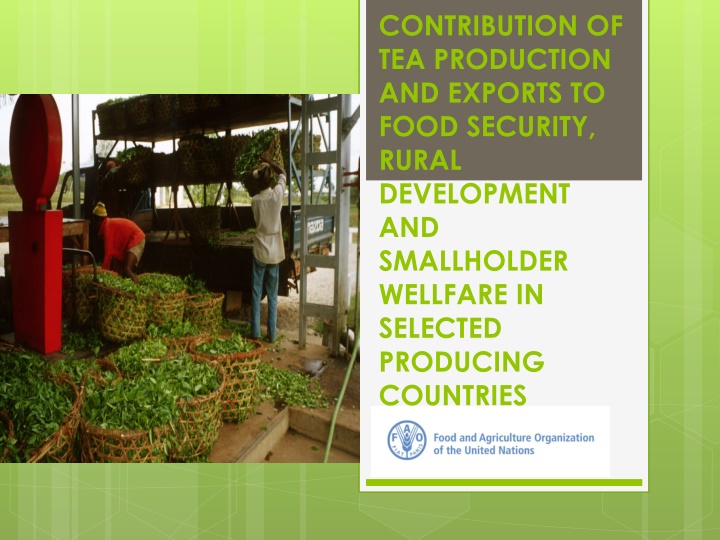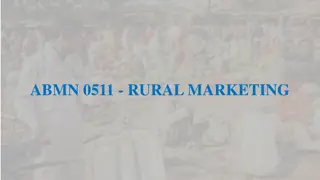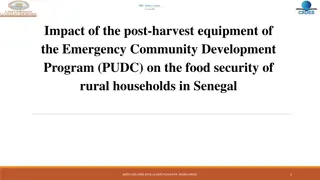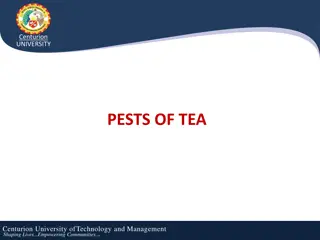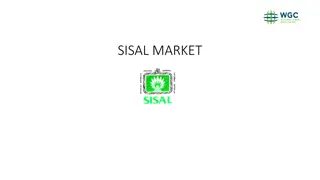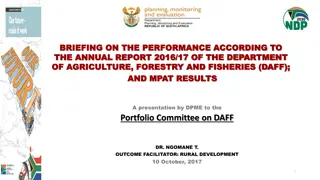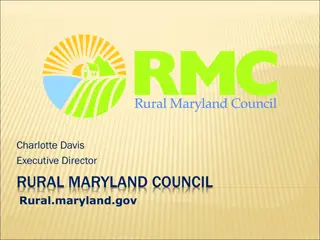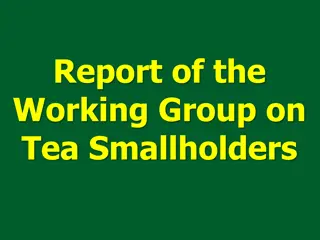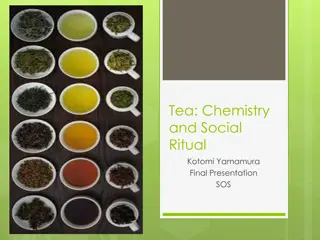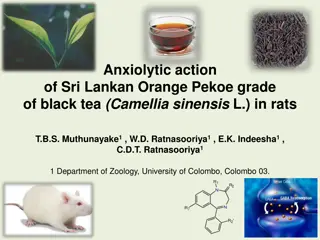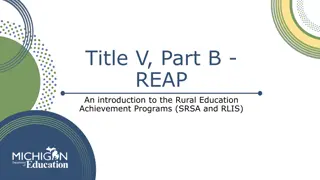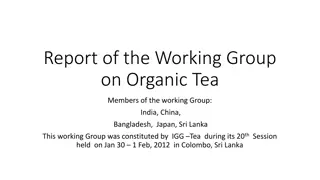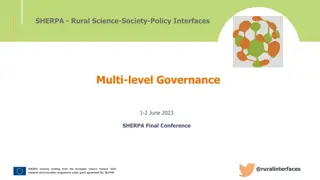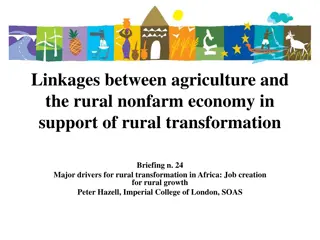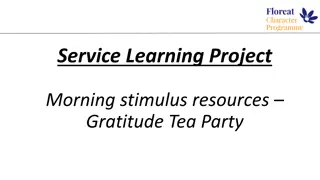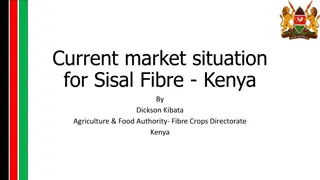Tea Production and Exports Contributions to Food Security and Rural Development
Tea production and exports play a significant role in food security, rural development, and smallholder welfare in selected producing countries such as India, Kenya, and Sri Lanka. The earnings from tea exports contribute to income growth, foreign exchange, employment, and national economic growth. Governments in these countries have established supportive policies to promote smallholder tea production. The presentation outlines the impact of tea production and exports on food security, the institutional setups supporting smallholders, and the trends in tea production across different regions.
Download Presentation

Please find below an Image/Link to download the presentation.
The content on the website is provided AS IS for your information and personal use only. It may not be sold, licensed, or shared on other websites without obtaining consent from the author.If you encounter any issues during the download, it is possible that the publisher has removed the file from their server.
You are allowed to download the files provided on this website for personal or commercial use, subject to the condition that they are used lawfully. All files are the property of their respective owners.
The content on the website is provided AS IS for your information and personal use only. It may not be sold, licensed, or shared on other websites without obtaining consent from the author.
E N D
Presentation Transcript
CONTRIBUTION OF TEA PRODUCTION AND EXPORTS TO FOOD SECURITY, RURAL DEVELOPMENT AND SMALLHOLDER WELLFARE IN SELECTED PRODUCING COUNTRIES
Outline of presentation Introduction; The role of tea export earnings in food security; Institutional set-up and support for smallholders in: India; Kenya; and Sri Lanka Conclusions
Introduction Background Objective of study Low response rate to the questionnaire Issues with responses Requirements for improvement
Introduction (contd) Emphasis of document CCP:TE 14/5: The role of export earnings on food security; The growing prominence of smallholders in the global tea economy; The institutions supporting tea smallholder development in India, Kenya and Sri Lanka.
Role of tea export earnings in food security Trade contributes to income growth Tea, production and exports Foreign exchange/employment; National economic growth; Help cover food import bills: 51 percent (Kenya) and 71 percent (Sri Lanka) in 2011.
Role of tea export earnings in food security (cont d) Figure 1. FAO Tea Composite Price Tea (FAO Composite Price) UScents/kg 350 320 290 260 230 200 2009 2010 2011 2012 2013 2014 Source: FAO Secretariat.
Institutional set up & support for smallholders Tea production by smallholders is growing worldwide Governments that have created policies to promote smallholders India Kenya Sri Lanka
Institutional set up & support for smallholders in India India tea production in thousand tonnes Year Small garden 316.73 363.09 374.91 Big garden Total 2011 2012 2013 798.99 763.24 825.5 1 115.72 1 126.33 1 200.41 Source: Tea Board of India.
Institutional set up & support for smallholders in India (cont d) Share of small and big gardens in total production (percent) Year 2011 2012 2013 Small garden 28.39 32.24 31.23 Big garden 71.61 67.76 68.77 Source:Tea Board of India.
Institutional set up & support for smallholders in India (cont d) Smallholder in India = tea growers holding up to 10.12 hectares Average size = < 1 hectare More than 200 000 smallholders in India Green leaves supplied to private, stand-alone bought leaf factories (BLFs) directly or through middlemen
Institutional set up & support for smallholders in India (cont d) Tea Board of India set up a new Small Grower Directorate (SGD) in 2013 Technical field offices posted throughout tea smallholder areas Average productivity of small and big gardens (yield kg made tea/hectare) Year Small gardens Big gardens 2011 2 000 1 970 2012 2 292 1 882 2013 2 367 2 035 Source: Tea Board of India.
Institutional set up & support for smallholders in India (cont d) SGD objective: Facilitate the collectivization of smallholder tea growers through Primary Producer Societies/ SHGs business entities which produce quality leaf for better price realization Capacity building Technical assistance and financial support
Institutional set up & support for smallholders in Kenya Kenya: production, consumption and exports of tea (tonnes)
Institutional set up & support for smallholders in Kenya (cont d) Kenya: tea export values (million USD) Export value (million USD) 1328.4 1328.3 1328.2 1328.1 1328.0 1327.9 1327.8 1327.7 2012 2013
Institutional set up & support for smallholders in Kenya (cont d) 60% of tea grown by smallholders Kenyan smallholders almost exclusively belong to the Kenya Tea Development Agency (KTDA) Services provided by KTDA: Farm inputs, materials and extension services; Inspection and collection of green leaf tea; and Processing and marketing.
Institutional set up & support for smallholders in Kenya (cont d) Kenya Tea Packers Limited (Kepeta) is A private company Owned inter alia by Kenyan tea smallholders through the KTDA and the Kenya Tea Growers Association. Objective: increase returns to its shareholders through packed value added tea.
Institutional set up & support for smallholders in Sri Lanka Sri Lanka production, consumption and exports of tea (tonnes)
Institutional set up & support for smallholders in Sri Lanka (cont d) Sri Lanka: tea export values (million USD) Export value (million USD) 1500 1450 1400 1350 1300 1250 2012 2013
Institutional set up & support for smallholders in Sri Lanka (cont d) There are over 400 000 tea smallholders in Sri Lanka 76% of Sri Lankan tea is grown smallholders Smallholders organized into tea smallholder development societies (TSDS).
Institutional set up & support for smallholders in Sri Lanka (cont d) The Tea Small Holdings Development Authority (TSHDA) Promotes and develops the tea smallholdings in Sri Lanka Assigned to increase tea production, marketing activities and improve productivity, Aim: to improve the livelihood of Sri Lankan tea smallholders. Functions: extension interventions; land development interventions; and social development interventions.
Conclusions The situation of tea smallholders continues to be problematic Governments of most tea producing countries have formulated policies Member countries are requested to complete the questionnaire senty by the Secretariat India, Indonesia and Kenya requested to complete the questionnaire in its entirety Countries which did not respond are requested to do so
